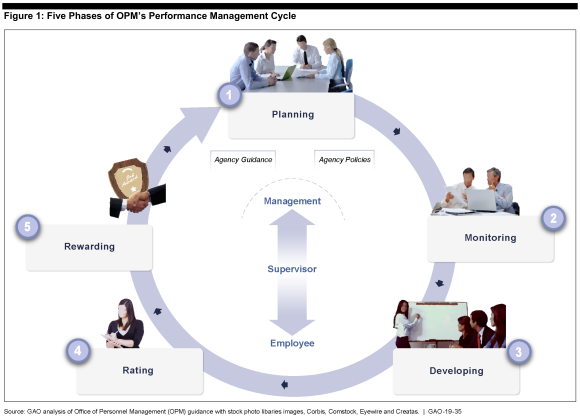
OPM can help agencies with performance evaluation, but agency isn’t the problem
A recent GAO report concluded that employees believe agencies are doing reasonably well on four of OPM’s Five Phases of Performance Management, with improveme...
A recent Government Accountability Office report highlighted the performance management practices of four agencies and indicated the Office of Personnel Management could do more to share best practices among agencies. The report focuses on Federal Employee Viewpoint Survey (FEVS) responses to questions that relate to employee confidence in the performance evaluation process.
GAO concluded that employees generally believe agencies are doing reasonably well with respect to four of OPM’s Five Phases of Performance Management, and need to improve on the fifth: Rewarding.
GAO noted that OPM is not adequately updating its performance management section of its website.
“OPM does not have a process for regularly updating its performance management website with new guidance and resources to ensure that the information is readily available,” they said. “Agency employees, such as human capital specialists, who visit OPM’s performance management website may be unable to find or access the most recent guidance and training available.”
GAO went on to say that although OPM identified innovation as one of its five values, GAO was unable to find any recent information on innovation for performance management in the government on OPM’s website.
“Specifically, we used ‘innovation performance management’ as a search term on the website and found the ‘Promoting Innovation in Government’ web page, which included archived material and was no longer being updated (see figure 15),” the report said. “As a result, agencies that use OPM’s website as a source of performance management guidance would be unable to find any current resources on performance management innovation. OPM officials explained that older material is archived based on the current leadership’s vision. The officials also confirmed that OPM did not have other active websites that contained innovative performance management practices gathered from external sources, which could be shared with other federal agencies. Implementing a strategic approach to sharing innovation in performance management would then allow OPM to provide relevant and updated information that agencies could use to modernize their performance management systems.”
GAO not looking deep enough?
While I believe GAO’s conclusion is sound, it does not go far enough and it may be shifting responsibility for the government’s shortcomings in performance management to OPM rather than focusing on more troubling findings. The report uses FEVS data to identify employee perceptions of how performance management is handled. It also uses the same data to determine how leaders perceive the job they are doing with respect to performance management.
Related Stories

President proposes, Congress disposes, but does the budget still work that way?
Asking OPM to put out better information on performance management is a good idea. Highlighting innovative practices, including those from the private sector, is a good idea. But what happens if the agency leaders think they are doing a great job already? An agency is unlikely to change how it handles performance management, including promotions, if the agency’s senior leaders think everything is going well. That disconnect between employee and management perceptions is a divide that must be bridged.
I have had discussions with senior executives and managers about this very issue when I was a senior executive in government myself. Sitting in our private offices, surrounded by staff, and with access to large amounts of information, senior leaders are often isolated from the people they lead. More often than not, what I would hear about subjects such as selection processes is “we know we are running a fair process and every selection produces unhappy applicants.” Whether the process is fair or not is not good enough. If the majority of employees do not have confidence in the decisions their leaders make regarding performance, recognition and promotion, morale and engagement will suffer. Good performers who believe they cannot get fair treatment will go elsewhere, and agency performance will suffer.
We can get OPM to improve how it shares information, but the biggest improvements will come when we convince people in leadership roles that they have to work on the trust issue. And they have to recognize that their perception of the agency where they work is influenced by their privileged status in the agency. If that does not change, it does not matter how much better OPM shares information.
Jeff Neal is a senior vice president for ICF and founder of the blog, ChiefHRO.com. Before coming to ICF, Neal was the chief human capital officer at the Homeland Security Department and the chief human resources officer at the Defense Logistics Agency.
Copyright © 2024 Federal News Network. All rights reserved. This website is not intended for users located within the European Economic Area.





